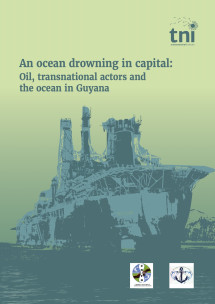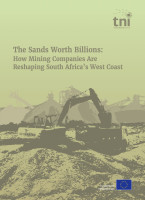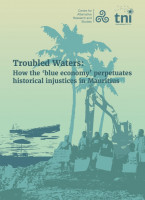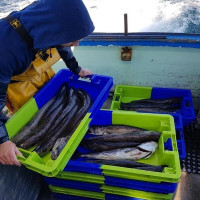An ocean drowning in capital Oil, transnational actors and the ocean in Guyana
Regions
This issue brief critically analyses Guyana's ocean economy. Focused on oil and gas, it explores the three circuits of capital, emphasising the severe impacts of the booming oil and gas industry on marine environments and coastal communities. Through interviews, research, and consultation with diverse experts, the publication aims to inform and empower local communities and beyond, fostering strategies for environmental, social, and economic justice.

Downloads
Authors
Key messages
- The discovery of large oil reserves in Guyanese waters and ExxonMobil's subsequent activities from 2015 threaten the livelihoods of Guyanese small-scale fishers and access to nutritious food for low-income families.
- Theconceptof‘circuitsofcapital’isusefulforanalysinganddeepeningtheunderstandingofoilextraction. By applying this analytical lens, the report looks beyond the site of extraction and understand how oil com- panies in Guyana finance their operations and sell the oil and gas they extract.
- Floating platforms (FPSOs) are making it possible for companies to extract oil in new (marine) territories in much shorter timeframes than they did previously.
- Two of the largest oil companies operating in Guyana, ExxonMobil and HessCorporation, are owned by numerous actors, with asset management companies and banks holding the largest shares.
- The state of Guyana receives a modest 14.5% of the profits from the sale of oil, whereas oil companies pocket the rest. This casts doubt on the ability of the government to use oil income to meet its green commitments.
- Therealisationoftheoilindustry'sambitionsinGuyanawillmakethecountryasignificantcontributorto global CO2 emissions. This will exacerbate the climate crisis and its dire impacts in Guyana including sea level rise, change of seasonality and a decrease in marine fauna, among others.
- Guyanese fishers claim that their fishing grounds have been taken over by oil exploration vessels and processing platforms. Together with oil tankers, these vessels reportedly cause seismic noise, oil spills and discharge ballast water, all of which threatens fishers' livelihoods and the health of the ocean.
- Guyanese Civil Society is working to come to terms with the rapidly changing landscape of oil and gas extraction. Some actors are already demanding the full recognition and respect of the rights of fishers; an immediate halt to all new or expanded oil operations; the phase-out of existing operations; and financial and technological support for adaptation and mitigation that contribute to a ‘just transition’. Given the serious social, climate, and environmental risks of the oil industry there is an urgent need for wider Guyanese civil society to unite behind shared demands that protect people, livelihoods, and the planet.
Introduction
This issue brief aims to critically analyse different forms of the ocean economy in Guyana, including its socioeconomic and ecological impacts, and how different groups are affected by its expansion. It is written, in particular, to inform fishing, coastal, and local communities in Guyana and the Caribbean about the developments in ocean sectors with the hope it will contribute to strengthening networks and alliances pursuing environmental, social and economic justice. The methodological approach coupled with the focus on oil companies also makes the publi- cation relevant for people and organisations beyond the Caribbean. It is the result of a collaboration between the Transnational Institute (TNI), the Caribbean Network of Fisherfolk Organisations (CNFO) and the Guyana National Fisherfolk Organization (GNFO).
In Guyanese waters, three economic sectors stand above the rest: shipping, fishing, and oil and gas. While this publication explores all three sectors, more attention is dedicated to the oil and gas industry because of its massive growth over recent years coupled with the severe impacts on the marine environment, the climate, and the livelihoods of coastal and fishing communities. The analysis explores what Marxist scholars describe as the ‘three circuits of capital’,1 namely the extractive or productive circuit; the commodity exchange or value chain circuit; and the financial or money circuit. Analyses of extractive industries often revolve around the first (production) circuit, as they focus on on-site strategies and impacts of extracting raw materials. Extending the analysis to the second (exchange) and third (monetary or financial) circuits allows us to build a holistic picture of the strategies, operations and interconnections between extractive companies.
We hope that this analysis, together with the exploration of the impacts of the three sectors on the Guyanese population and environment, will help movements, alliances and networks to develop or refine their strategies.
This publication begins by introducing the Guyanese fish- ing sector. The oil and gas industry is then explored from its production, exchange and financial perspectives (the three circuits). Against this background, the brief explores how oil and gas extraction and industrial fishing aggravate the harsh socioeconomic conditions in coastal and fishers communities and negatively impact the Guyanese marine environments. Moreover, the effects and contradictions of relying on an alarmingly polluting industry such as oil and gas to develop Guyana are also explored. Finally, this brief explores how local actors are resisting the expansion of the ocean economy in the country, along with some ideas for future action.
The publication is based on research conducted through- out 2022 and 2023, which included interviews with Guyanese fishers and academics. More concretely, primary research engaged with one representative and two workers in the fisheries sector; one environmental consultant and one expert on nature conservation from Guyana; and two experts in marine spatial use and planning in the Caribbean. It also includes the analysis of several relevant governmental, scholarly, corporate and policy documents, including national and regional governmental plans, reports and scholarly publications on the ocean economy, the fisheries sector or climate change. Core findings were consulted with the co-publishing organisations.


